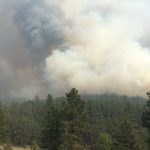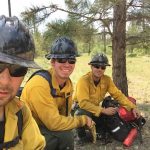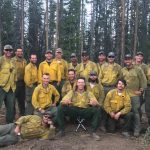By: Mariam Hess
Imagine you are working a summer job as a college student.
What are you doing? Retail work? Food service?
Then imagine that you are really working for the Horton Bureau of Indian Affairs, being paid by the federal government to fight fires in Wyoming and New Mexico. That’s how Isaac Whitman, Western student, spent the summer of 2017.
Whitman was the newest member of the Kansas fire team from Western. As a sophomore honors student majoring in wildlife conservation and management, Whitman said that he discovered the job through the Western Student Chapter of the Wildlife Society.
“It was related to my major and gave me great experience, but it wasn’t required or anything like that,” Whitman said.
“Really the two biggest reasons I did it was to get marketable experience and it paid extremely well.”
The fire crew was on call the entire summer. They were required to drop everything and go as soon as they were called.
The purpose of Whitman’s team was to exclusively fight wildfires on the ground, and they were only called when there was an active fire or a fire imminent. The Kansas fire team would meet in Horton to assemble their gear and rental trucks. From there, they would drive and go to the site of the wildfire and stay for the span of their deployment, or “roll,” which would last for 14 days.
Brad Thomas, a fellow student from Western, said that the experience is worth more than just a hefty check and experience in their fields of study.
“The best part about this job is traveling the country and working alongside the crew,” Thomas said. “You become brothers out there. The gratitude from the public after you have been working on a fire is a great feeling.”
The crew worked two fires where they had to stop fires, clear brush along roads, clear out flammable materials and work in already burned areas to ensure there were no “hot spots” close to the perimeter. Whitman said he and his crew typically worked 14-16 hour days, with sometimes less than seven hours of sleep.
However, the experience was more than worth the hiccups along the way.
Blake Koelling, another Western student, said the experience was beneficial for him as well.
“The best thing is knowing the work you are doing out there could save homes and lives,” Koelling said. “It makes you work that much harder at what you’re doing.”
All three men hope to go back next summer to work against the fires. The experience has more than prepared them for their future careers, as well as for their continuing studies at Western.




